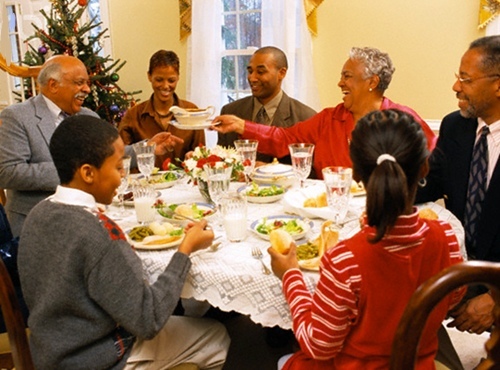This holiday season, try to imagine what it would be like if no one sitting around the dinner table took any interest in getting to know you. What if no one in your family asked about your life, or seemed to care how you were doing? Picture how the holidays would be different if you were excluded from the stories, the jokes and the games that your family shares.
The feeling of isolation at family events is sadly common for deaf people. Deaf individuals who come from hearing families often grow accustomed to spending holidays quietly in the background. They get used to watching captioned TV, texting with friends or simply daydreaming in a corner during holiday gatherings.
If hearing family members choose not to learn sign language, deaf children grow up without ever really getting to know their own relatives or learning their family history. When there is no communication, it is difficult to form relationships. After years go by, it becomes harder and harder to bridge the gap.
As a CODA (Child of Deaf Adults), I spent many family events doing the best I could to provide my deaf mother and siblings with access to conversations. CODAs often fall into the role of interpreter for deaf family members, and we usually don't mind doing it.
But one person can not realistically provide full access to communication when there are multiple deaf and hearing parties. Additionally, a person who is involved in the social dynamics of the family can not facilitate communication in an impartial way. For example, a CODA might alter one family member's actual message to avoid hurting another relative's feelings.
For my deaf family members, holiday events were always pretty boring. Any conversations they did have with hearing family members were limited and generally basic. So last year, for my mother's birthday, I hired an team of ASL interpreters to provide services for her surprise party. My hearing relatives absolutely loved getting to know our deaf family in a whole new way. My deaf siblings and nieces were thrilled to have real conversations with all these people they had only known on a superficial level; the ability to communicate allowed their relationships to grow and strengthen.
But for my mother, a whole lifetime of feeling excluded could not be erased in one day. While she appreciated the way the interpreters connected the family, it was hard to make up for all the family gatherings spent as an outsider. At the end of the party, everyone kept asking "Why haven't we hired interpreters before?" It hadn't occurred to them what a big difference the ability to truly communicate would make.
As a hearing person, maybe you've never considered what it is like to be deaf in a hearing world. You might take it for granted that you can walk around a party and casually chat with people, whether they are friends or total strangers. You can easily discuss current events, gossip or TV shows. The ability to communicate aurally/verbally is a cultural privilege shared by many. It can be easy for people to forget how much of our social bonding relies on communication.
When you provide professional interpreters, you actively welcome your deaf relatives into a hearing space. You invite them into your family -- all the laughs and debates and reminiscing that bond us with our kin.
Providing communication access for deaf relatives sends a clear message that their participation is valued. It was such a joy to watch my deaf siblings and little nieces get to know my hearing aunts, breaking through generations of communication barriers, making real connections. It's hard to believe they all went so long without sharing these moments!
At your next family gathering -- whether it's a holiday dinner or a wedding -- consider providing a professional sign language interpreter so that your deaf and hearing family members can get the most out of the time they spend together.

